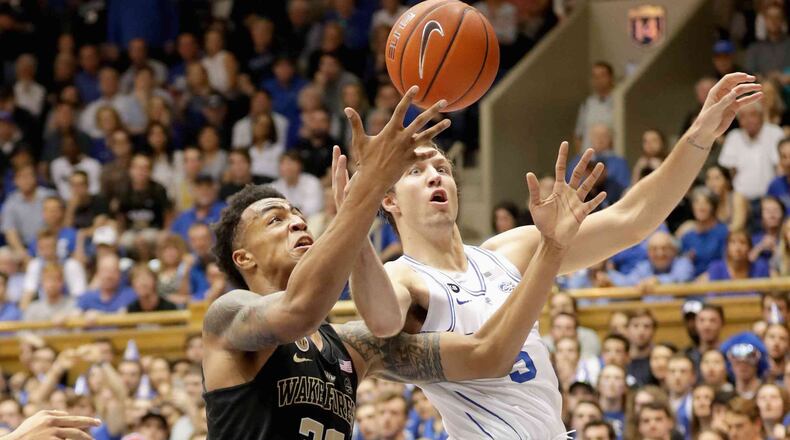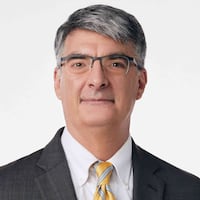John Collins fouled too much.
As well as the big man played during his freshman season at Wake Forest, he had trouble staying on the floor. That was a problem.
Collins made significant strides to remain on the floor during his sophomore season, and that was a major reason he averaged nearly 20 points and 10 rebounds per game and found himself ready for the NBA draft. Lesson learned.
The Hawks selected Collins with the No. 19 overall pick, and the power forward will have to learn the lesson at another level. The NBA level.
“He was very productive his freshman year,” said Danny Manning, Collins’ college coach. “He just fouled a lot. Like most freshman bigs do. If you go back and look at his production, it was off the charts per minute as a freshman.
“Let me ask you this, if Michael Jordan would have gotten three or four fouls in the first half of every game, how much would he have played? That is anybody. Whether it’s an offensive foul or a defensive foul, you can’t help your team if you are not on the court.”
The professional education for Collins began Friday in the Hawks 75-72 loss to the Nets in the Las Vegas Summer League. Collins finished with eight points, 11 rebounds and two steals. And only three fouls.
As a freshman, Collins averaged 7.3 points and 3.9 rebounds in 14.4 minutes. He had a .547 shooting percentage. He averaged 7.4 fouls per 40 minutes. As a sophomore, he averaged 19.2 points and 9.8 rebounds in 26.6 minutes. He had a .624 shooting percentage. He averaged 4.5 fouls per 40 minutes.
“It was two or three things,” Collins said of his development. “First, was realizing my value to the team on the court and how much value I had as opposed to when I was off. That was a big thing.
“The other thing was me and coach Manning worked hard on simplifying the game, making it as easy as possible. That helped me a lot. Using my body in different ways so I could stop fouling.
“The third thing was experience. My sophomore year compared to my freshman year, I played a lot more. I was realizing what I was doing. You get early fouls and you get pulled and you are sitting down. You are on a short leash. I already know what that feels like.”
Collins said Manning was hard on him and that he didn’t immediately realize the impact of the teachings. Manning knows of what he speaks. A 6-foot-10 power forward himself, he played 15 NBA seasons after a decorated college career.
Manning spoke from experience in helping Collins with his decision to leave school early and move to the professional ranks. He knew the pluses and minuses. Manning lived them. He spoke to Collins directly. Manning cautioned there would be more learning to do.
“Any rookie going into the NBA will have a learning curve guarding at that level,” Manning said. “The bottom line is, every kid better make the adjustment if they want to play. That’s what it is.”
The Hawks have been impressed with the athletic ability of Collins early in his tenure with the team. According to several team personnel, Collins has showed highlight-worthy dunks during workouts before summer league.
Collins showed an ability to consistently score from 17 feet and in during his college career. He was named the ACC’s Most Improved Player last season. The development will have to continue. The Hawks will want Collins to step back and add an outside threat to his game. Manning said he believes Collins has the ability. Collins doesn’t lack the self-confidence after his collegiate improvements.
“I was stepping into a starting spot at an ACC school, which is a big spot for anyone, especially a guy who didn’t play as much my freshman year,” Collins said. “I was ready for it.”
About the Author
Keep Reading
The Latest
Featured



